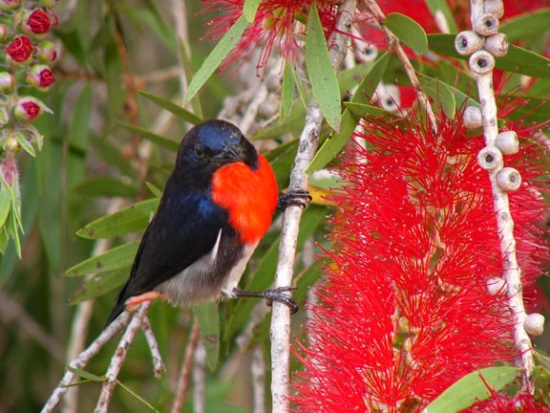| Line 2: | Line 2: | ||
[[Image:Mistletoebird.jpg|thumb|550px|right|Photo by Taco]] | [[Image:Mistletoebird.jpg|thumb|550px|right|Photo by Taco]] | ||
==Identification== | ==Identification== | ||
| − | + | 10-11cm. Blue-black, red chest, slight red undertail, and a black centre stripe running down its white belly. The female is dark grey, with only a light grey belly and just a touch of red under the tail. | |
| + | |||
==Distribution== | ==Distribution== | ||
| − | + | [[Australia]], [[Papua New Guinea]], and eastern [[Indonesia]]. | |
==Taxonomy== | ==Taxonomy== | ||
==Habitat== | ==Habitat== | ||
| − | + | Trees and shrubs. | |
==Behaviour== | ==Behaviour== | ||
| − | + | Diet includes the berries of the mistletoe plant, as well as nectar, pollen, spiders, and insects. | |
| − | The female | + | |
| − | + | ||
| + | The female builds the nest of crushed plants and spider webs, and incubates the eggs. | ||
==External Links== | ==External Links== | ||
{{GSearch|Dicaeum+hirundinaceum}} | {{GSearch|Dicaeum+hirundinaceum}} | ||
*[http://www.aviceda.org/abid/birdimages.php?action=birdspecies&fid=79&bid=1434 View more images of this species on the ABID] | *[http://www.aviceda.org/abid/birdimages.php?action=birdspecies&fid=79&bid=1434 View more images of this species on the ABID] | ||
| − | [[Category:Birds]] | + | [[Category:Birds]][[category:incomplete]] |
Revision as of 16:18, 19 October 2007
- Dicaeum hirundinaceum
Identification
10-11cm. Blue-black, red chest, slight red undertail, and a black centre stripe running down its white belly. The female is dark grey, with only a light grey belly and just a touch of red under the tail.
Distribution
Australia, Papua New Guinea, and eastern Indonesia.
Taxonomy
Habitat
Trees and shrubs.
Behaviour
Diet includes the berries of the mistletoe plant, as well as nectar, pollen, spiders, and insects.
The female builds the nest of crushed plants and spider webs, and incubates the eggs.




